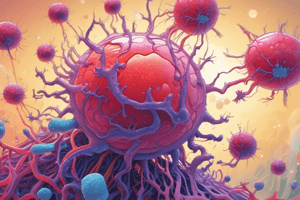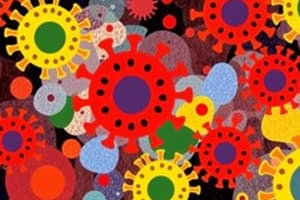Podcast
Questions and Answers
Which type of immune cells are responsible for inducing IFN-γ production and killing tumor cells?
Which type of immune cells are responsible for inducing IFN-γ production and killing tumor cells?
- NK cells (correct)
- Dendritic cells
- Macrophages
- Monocytes
What type of signaling is involved in attracting and recruiting immune cells to the site of infection?
What type of signaling is involved in attracting and recruiting immune cells to the site of infection?
- Paracrine signaling
- Autocrine signaling
- Chemokine signaling (correct)
- Endocrine signaling
Which of the following is NOT a function of macrophages?
Which of the following is NOT a function of macrophages?
- Antigen presentation
- Antibody production (correct)
- Phagocytosis
- Cytokine production
What type of cells are involved in the engulfment of pathogens and larger particles?
What type of cells are involved in the engulfment of pathogens and larger particles?
Which cytokine is involved in activating macrophages and cell-mediated immunity?
Which cytokine is involved in activating macrophages and cell-mediated immunity?
What is the process by which immune cells migrate from the blood stream into infected tissues?
What is the process by which immune cells migrate from the blood stream into infected tissues?
Which type of interferon is produced by lymphocytes and NK cells and activates macrophages?
Which type of interferon is produced by lymphocytes and NK cells and activates macrophages?
Which of the following is a function of antigen presentation?
Which of the following is a function of antigen presentation?
What is the main function of the physical barriers in innate immunity?
What is the main function of the physical barriers in innate immunity?
Which of the following is NOT a type of antimicrobial peptide found in secretions?
Which of the following is NOT a type of antimicrobial peptide found in secretions?
What is the primary function of the spleen in innate immunity?
What is the primary function of the spleen in innate immunity?
Which type of immune cell is primarily involved in phagocytosis?
Which type of immune cell is primarily involved in phagocytosis?
What is the role of collectins in innate immunity?
What is the role of collectins in innate immunity?
Which of the following is NOT a function of mast cells?
Which of the following is NOT a function of mast cells?
What is the primary function of lymphatic vessels in innate immunity?
What is the primary function of lymphatic vessels in innate immunity?
Which of the following organs is responsible for T-cell maturation?
Which of the following organs is responsible for T-cell maturation?
What is the function of proteolytic enzymes in killing and degradation?
What is the function of proteolytic enzymes in killing and degradation?
Which type of antigens are presented by MHC class I?
Which type of antigens are presented by MHC class I?
What is the result of antigen presentation by MHC class I?
What is the result of antigen presentation by MHC class I?
Which cells are responsible for antigen presentation via MHC class II?
Which cells are responsible for antigen presentation via MHC class II?
What is the role of defensins in killing and degradation?
What is the role of defensins in killing and degradation?
What is the function of respiratory burst in killing and degradation?
What is the function of respiratory burst in killing and degradation?
Which type of immunity is primarily involved in the response to intracellular pathogens?
Which type of immunity is primarily involved in the response to intracellular pathogens?
What is the role of NO in killing and degradation?
What is the role of NO in killing and degradation?
Study Notes
Monocyte and Macrophage
- Engulf pathogens and larger particles, including dead cells and damaged tissues
- Present antigens on MHC class I or II
NK Cells
- Induce IFN-γ production, activating macrophages and cell-mediated immunity
- Kill tumor cells, viral-infected cells, and protozoan-infected cells using granzyme and perforin
Inflammatory Response
- Mediated by cytokines, chemokines, and innate immune cells
- Involves phagocytosis and inflammatory response
Cytokines
- Paracrine: released by producer and acts on neighboring cells
- Autocrine: produced, released, and acts on the producer
- Endocrine: released by producer into the circulation and acts on a distant cell
Interferons
- IFN-α and IFN-β: produced by macrophages, fibroblasts, endothelial, and epithelial cells; activated by viral dsRNA; have antiviral effects
- IFN-γ: produced by lymphocytes and NK cells; activates macrophages
Migration of Cells from Blood Stream into Infected Tissues
- Rolling: a process involving IL-1, TNF-α, and vasodilation
- Involves activation of innate immune cells, such as PMN cells, and the release of chemokines
Innate Immunity and the Inflammatory Response
- Innate immunity: pre-existing defense against infection, mounts an immediate response to infectious agents
- Activation of innate immunity leads to an inflammatory response
Components of Innate Immunity
- Physical barriers: skin, mucous membranes, and epithelial cells
- Chemical and biochemical barriers: lysozyme, fatty acids, HCL, and lactic acid
Antimicrobial Peptides in Secretions
- Defensins: found in mucosal and skin secretions
- Cathelicidins: found in mucosal secretions
- Collectins: bind to polysaccharides on microbes
Lymphoid Organs
- Primary: bone marrow (B cell maturation) and thymus (T cell maturation)
- Secondary: lymph nodes, spleen, and MALT (Payer’s patch)
Lymphatic Vessels and Spleen
- Lymphatic vessels connect tissues with lymph nodes and contain lymphocytes and tissue dendritic cells
- Spleen deals with antigens shed into the bloodstream and is not connected to lymphatic vessels
Innate Immune Cells
- Mast cells: involved in hypersensitivity and release histamine, heparin, and proteolytic enzymes
- Basophils: involved in hypersensitivity and release histamine, heparin, and proteolytic enzymes
- Eosinophils: involved in hypersensitivity and parasitic infection, and release toxic agents
- Neutrophils: phagocytose small pathogens and release oxygen radicals
Killing and Degradation
- Lysosomal dependent: involves chlorine products, defensins, and proteolytic enzymes
- Non-lysosomal dependent: involves respiratory burst, oxygen radicals, and NO (inhibits viral replication)
MHC Class I and II
- MHC class I: presents endogenous peptides, involved in antigen presentation, and leads to cytotoxicity
- MHC class II: presents extracellular antigens, found on antigen-presenting cells, and signals the activation of other immune cells and their inflammatory responses
Studying That Suits You
Use AI to generate personalized quizzes and flashcards to suit your learning preferences.
Related Documents
Description
Quiz about the functions of monocytes, macrophages, and NK cells in the immune system, including antigen presentation, pathogen elimination, and inflammatory response.




